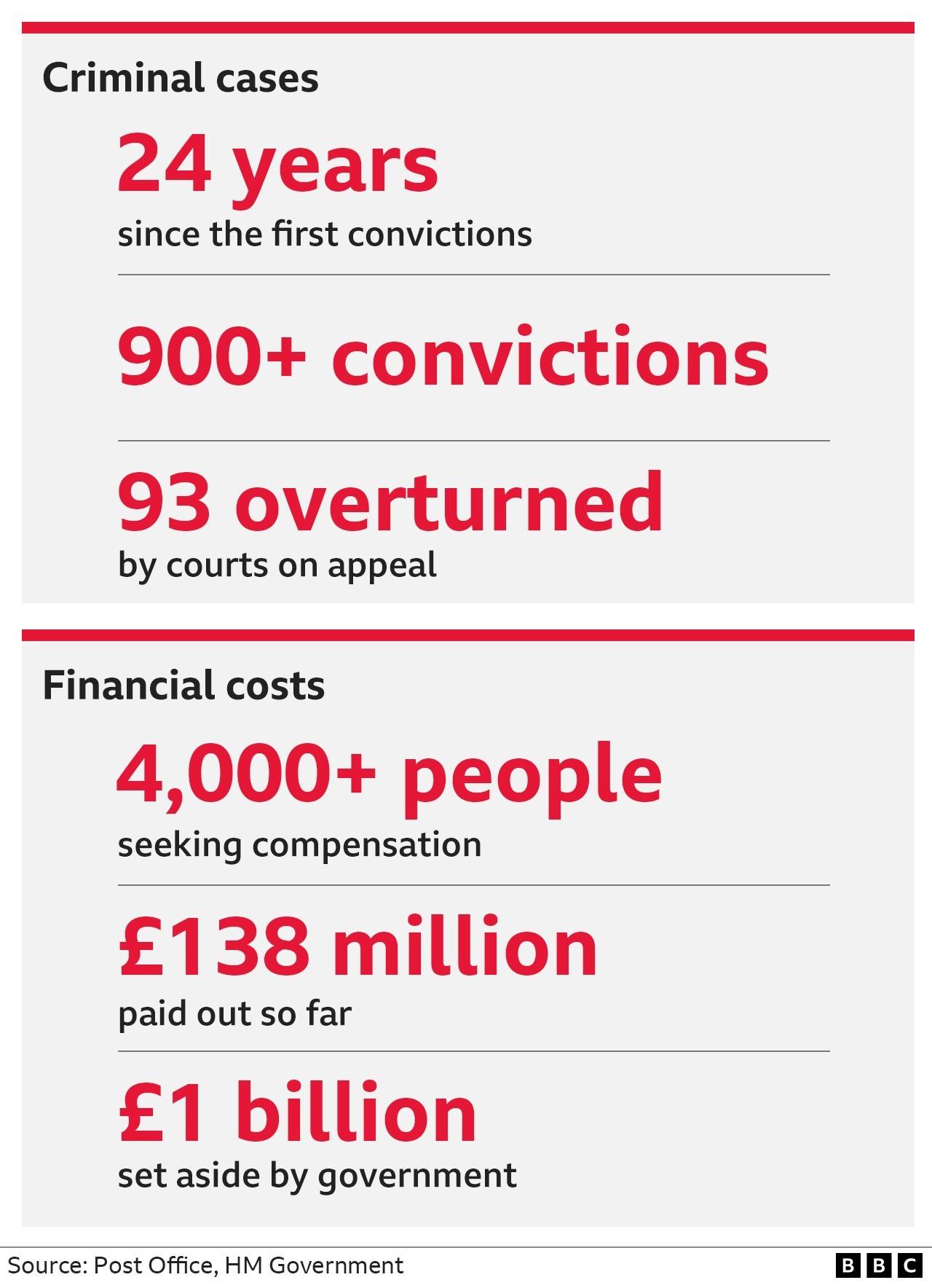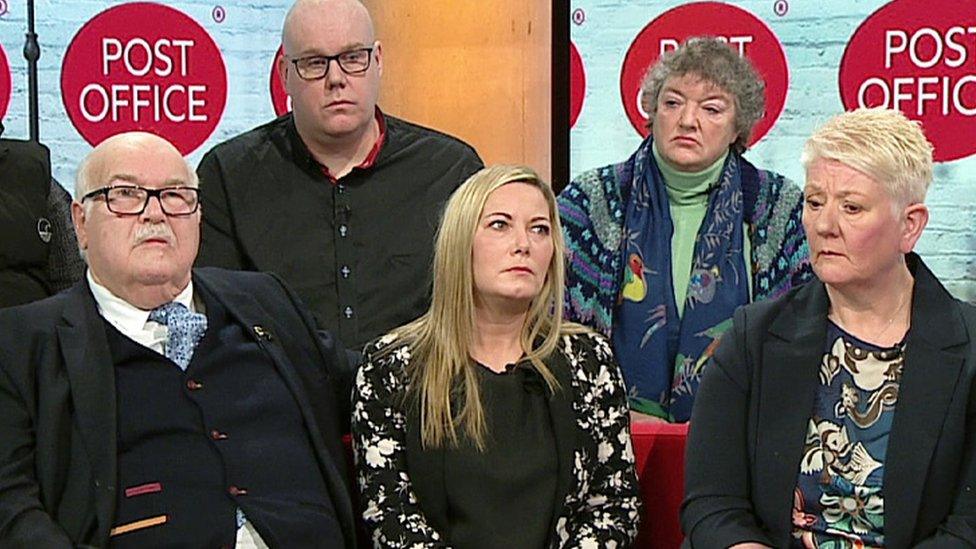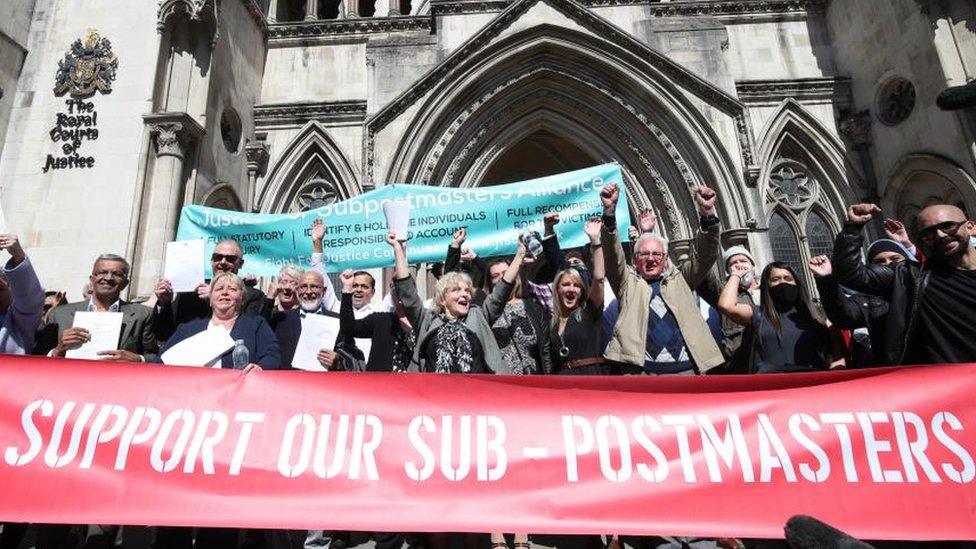Post Office scandal: Investigator denies claims of 'mafia' behaviour
- Published
Former Post Office investigator Stephen Bradshaw: "I was not technically minded"
Ex-Post Office investigator Stephen Bradshaw has denied he and colleagues behaved like "mafia gangsters" towards wrongly accused sub-postmasters.
Mr Bradshaw was involved in the criminal investigation of nine sub-postmasters and was giving evidence to the Post Office inquiry.
He denied intimidating or misleading the sub-postmasters he investigated.
Hundreds were wrongly prosecuted between 1999 and 2015 after being falsely accused of stealing money.
There were more than 900 convictions linked to the scandal, with only 93 so far being overturned, after a faulty computer system called Horizon made it look like money was missing from accounts.
The government has pledged to bring in a new law to "swiftly exonerate and compensate victims" of the scandal.
Mr Bradshaw - who joined the unit tasked with investigating sub-postmasters in 2000 - was questioned for several hours on Thursday.
Extracts were read out from a statement by Shazia Saddiq, a former sub-postmistress originally from Newcastle, who used to run three Post Offices in the city.
"I have received... intimidating telephone calls from Stephen Bradshaw who began calling me before I knew he worked for the Post Office. He did not identify himself in his calls, he just made demands of me," the statement read.
Recalling a date in 2016, Ms Saddiq, a single mother, said: "Stephen Bradshaw called me and I refused to speak to him because I did not know who he was or who he worked for.
"In that telephone call... he called me a bitch which I found extremely distressing."
Mr Bradshaw called her claims "completely untrue". He denied "hounding" her and insisted he would always say who he was on a phone call.
Ms Saddiq said she and her children - who lived above one of their Post Offices - were physically assaulted due to the false allegations.
"People chucked flour and eggs at us and after that, we fled and I've never been back. My daughter was eight and my son four, we left so quickly that all they packed were their teddies," she told the BBC.
Jacqueline McDonald was wrongly jailed over a supposed theft in 2011.
In a statement, she accused Mr Bradshaw of bullying, saying he accused her of lying while she was under investigation.
She was sentenced to 18 months in prison after pleading guilty to theft and false accounting over losses recorded by Horizon at the Post Office branch she ran in Broughton. Her conviction was later overturned and described as an "affront to justice" by a senior Court of Appeal, external judge.
Despite knowing she was innocent, the inquiry heard how Mrs McDonald pleaded guilty in the hope it would mean she avoided a custodial sentence, but it ended up destroying her life.
In her 2008 interview with Mr Bradshaw, which was read to the inquiry, Mrs McDonald was accused by the investigator of telling him a "pack of lies".

More on the Post Office scandal

Mr Bradshaw was asked in depth about his role leading the investigation into Mrs McDonald.
Counsel to the inquiry Julian Blake compared his language to something "you might see in a 1970s television detective show".
Responding to Mrs McDonald's allegations of aggressive behaviour in his witness statement, Mr Bradshaw said: "I refute the allegation that I am a liar. I also refute the claim that Jacqueline McDonald was bullied."
He added: "Jacqueline McDonald is also incorrect in stating Post Office investigators behaved like mafia gangsters looking to collect their bounty with the threats and lies."
Mr Bradshaw told the inquiry he still worked for the Post Office as a security manager.
He rejected a suggestion by Mr Blake that he recognised that Mrs McDonald's case raised wider issues with the Horizon system, but "pressed on" for "career-boosting" purposes.
In 2012, Mr Bradshaw signed a statement saying he had "absolute confidence" in the integrity of the IT system, the inquiry was told.
But he told the inquiry on Thursday that he was not "technically minded" and the statement had been written by lawyers, adding: "In hindsight... there probably should have been another line stating, 'These are not my words'."
Mr Bradshaw was also questioned about a letter concerning the case of Katherine McQue who, according to the 2011 document, was given an "indication" that a guilty plea to fraud was acceptable "so long as the defendant stipulated in her basis of plea that there was nothing wrong with Horizon".
Asked if it was appropriate "for someone representing the Post Office to say 'we will accept your plea, but only if you don't blame Horizon?'", he paused briefly before replying: "Probably not."
Watch: Post Office scandal victims share their stories with BBC
Thursday's hearing was the first since the inquiry resumed after its Christmas break, and comes after a fortnight in which an ITV drama on the subject has triggered renewed public interest and government action around the scandal.
The Post Office inquiry began in February 2021. It is an independent public statutory inquiry aimed at gathering a clear account of the failings of the Horizon IT system.
The faulty software was supplied to the Post Office by Fujitsu and introduced in 1999. It was used for tasks including accounting and stocktaking.
Mr Bradshaw was the latest Post Office investigator to appear before the long-running inquiry, with another 13 set to come.
For almost 350 years the Post Office has investigated fraud, thanks to the legal principle that anyone in England and Wales can privately prosecute a suspect for a crime. That power is also regularly used by the RSPCA.
The BBC's legal correspondent, Dominic Casciani, says the evidence shows that time and again defendants were not shown information about Horizon's flaws. That breach of the court rules of disclosure meant they were denied a fair and just trial.
Next week the chief executives of the Post Office and Fujitsu will be grilled by MPs during a Business and Trade Committee evidence session.
Additional reporting by Sam Hancock

Related topics
- Published10 January 2024

- Published10 January 2024
